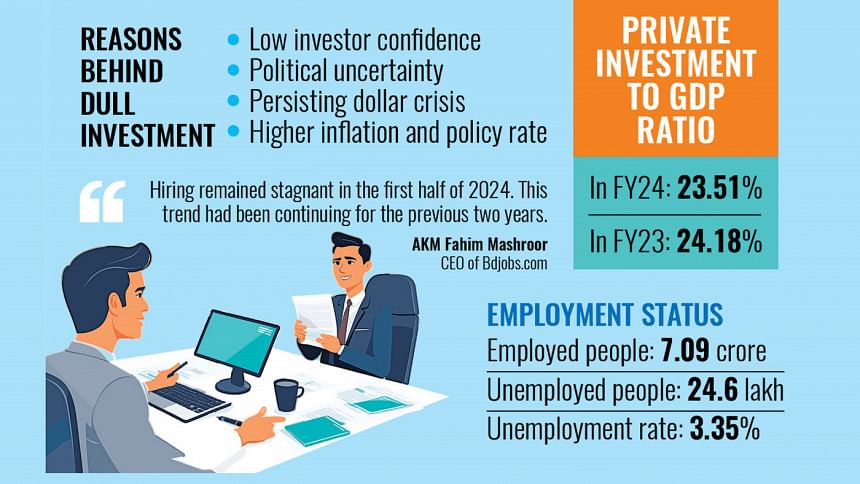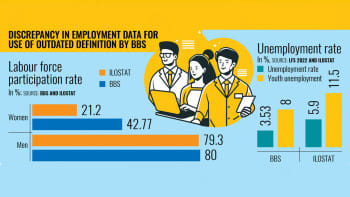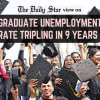Not a good year for job-seekers

Fresh graduates, their faces pale and uncertain, spent 2024 poring over newspaper job advertisements, applying for any suitable position and frantically appearing for recruitment exams in Dhaka.
The year was marked by somewhat regular public recruitments until June -- before a nationwide student movement turned into a full-blown anti-government campaign.
However, the private sector offered far fewer new jobs than the number of fresh graduates entering the job market.
Throughout the year, economic and political gauges constantly beeped red: a slowing economy, falling capital machinery import, sluggish private sector credit appetite, a nationwide upheaval culminating in the government ouster and the formation of an interim government.
Amid the turmoil, the overall job market fared poorly in 2024.
The year began with roughly 10 lakh unemployed graduates, according to the latest official data from the Bangladesh Bureau of Statistics (BBS).
In Bangladesh, public jobs represent around 6 percent of the employment while the private players accommodate the remaining workforce.
In 2024, a combination of factors such as global crises, local political instability, a worsening US dollar crisis and high inflation halted expansion plans.
Therefore, private firms saw their appetite for fresh credit waning. Private sector credit growth decelerated to 8.30 percent in October, the lowest in 41 months, according to the Bangladesh Bank.
This figure is the lowest since May 2021, when credit growth fell to 7.55 percent during the Covid-induced lockdowns.
Besides, private investment as a percentage of the country's GDP has declined for the past three years.
In the 2023-24 fiscal year, the private investment to GDP ratio decreased by 0.67 percentage points year-on-year to 23.51 percent, according to BBS data.
These figures suggest that businesses were hesitant to expand or take up new ventures, limiting the potential for new job opportunities.
AKM Fahim Mashroor, CEO of Bdjobs.com, the largest job site in Bangladesh, said hiring remained stagnant in the first half of 2024. This trend had been continuing for the previous two years.
"Political upheaval severely impacted hiring between July and September," Mashroor said. "However, the situation has shown some improvement in October to November."
He said that hiring has not fully normalised as the economic situation still remains uncertain.
After the government ouster in August and the formation of the interim government, a crackdown on corruption opened up investigations of several business tycoons.
This also impacted the labour market to some extent.
For instance, Beximco Group recently laid off nearly 40,000 workers across its 15 apparel units in Gazipur citing a lack of work orders.
Following the August changeover, Beximco came to the spotlight with its Vice-Chairman Salman F Rahman, an adviser to the previous prime minister who allegedly weaponised his influence for business gains, being arrested and now staying behind bars.
'FORMAL JOBS MIGHT HAVE SHRUNK'
"The year 2024 has seen a sharp decline in investment and output growth. The projected GDP growth for the year is significantly lower than recent trends," said Rizwanul Islam, a special advisor for the International Labour Organisation (ILO) in Geneva.
"Consequently, employment growth must have also declined substantially," he said.
"In all likelihood, growth in formal sector jobs, especially in manufacturing, has been negative," he added. "In such circumstances, people often resort to lower-quality jobs in the informal economy or share work in agriculture."
"To my knowledge, little has been done to address overall employment and youth employment in particular," he added.
"The government set an ambitious target of increasing the [private investment to GDP] ratio to 27.34 percent in the FY25 budget. However, achieving this goal remains uncertain due to persistent economic challenges and uncertainty," said Deen Islam, an associate professor of economics at the University of Dhaka.
'TICKING TIME BOMB'
A white paper panel that assessed the state of the economy and submitted its report to the interim government referred to the mismatch between employability and labour market dynamics in Bangladesh as a "ticking time bomb".
According to the white paper, the unemployment rate among educated youth has increased 2.5 times since 2010 due to a mismatch between their qualifications and the structure of industries and the economy.
"Not only that, despite having tertiary-level education, these graduates are ill-prepared for the market due to low technical knowledge," the paper added.
Over the past 12 years, the number of tertiary graduates has increased by about 2.5-fold, accounting for around 9 percent of the total labour force in 2022.
Hand in hand, the unemployment rate of this group increased from 4.9 percent in 2010 to 12 percent in 2022.
"Special attention must be given to address the precarious job situation, especially for educated job seekers," said Rizwanul Islam.
He also said, "It's easy to say that they should create their own jobs. However, in a situation where the real economy is struggling, it is difficult for anyone to find a way to create decent jobs, let alone for newcomers to the labour market. Special programs are needed to help them."
"Ultimately, there is no alternative to reviving the economy's growth trajectory."
All efforts must be made to restore investor confidence and channel investments towards sectors that can drive higher employment growth, he said.

 For all latest news, follow The Daily Star's Google News channel.
For all latest news, follow The Daily Star's Google News channel. 








Comments